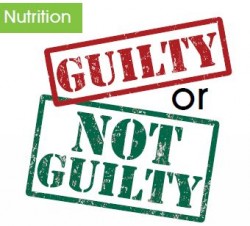The Natural Weigh
Guilty or Not Guilty?
So, you cheated on your healthy meal plan, and now you’re wondering if you should call it quits. The answer is NO! In fact, let’s stop calling it cheating, as the word “cheating” makes you automatically feel guilty.  Allowing yourself room to indulge your food desires is realistic and knowing that you can still enjoy some of your favorite foods each week will make the fact that you are eating healthier less of a punishment or a chore, and more about living in a way that can still be fun. Get over the guilt trip and get back on your program!
Allowing yourself room to indulge your food desires is realistic and knowing that you can still enjoy some of your favorite foods each week will make the fact that you are eating healthier less of a punishment or a chore, and more about living in a way that can still be fun. Get over the guilt trip and get back on your program!
The Importance of Wiggle Room
Some healthcare providers do not support the cheat meals, free days or “refeeds” — for obvious reasons (you break your rhythm, cheat foods are often unhealthy, it’s possible to produce hormones, etc.). As a dietitian, I appreciate these concepts; however, in my professional experience consulting with clients on an individual basis, I have learned that it is usually unrealistic. Imagine never again indulging in foods you love, no matter how healthy you plan to live. It would be extremely difficult and unrealistic for most. A diet plan that is more of a lifestyle should include some wiggle room. In other words, you should plan to give yourself an occasional break — a “break meal.”
Maybe you need more convincing that the occasional indulgence is healthy. What if I told you that science supports this approach? There is some promise in recent research that certain hormones in our body are dependent on some extra calories. When you diet or restrict calories and nutrients, your body will start to deplete leptin, a powerful hormone that can influence your weight loss or even cause you to gain weight if manipulated in the wrong way.
The Ground Rules
Decide when and how you will “pamper” yourself. Having a specific treat to look forward to can help you avoid temptation and stay on track the rest of the days. However, a free meal – not a whole day – only works when it is enough to feel indulgent, but not so much that you set yourself back or end up wanting to eat more. The key is balancing the bad with the good and finding what works for you individually.
Some people have a hard time getting back on the program the next day. If you know this about yourself, be careful not to fall into the trap. A rule of thumb I encourage with my clients is to indulge when it’s worth it, and pass when it’s not. For example, you might say to yourself, “I’ll skip these mediocre-looking cookies because I know I’m going out to a great restaurant on Friday night!” Would the treat be worth exercising a bit longer the next day just to be able to enjoy it guilt free? The answer to that question is up to you.
The Verdict: Get Over the Guilt Trip
Human beings are not perfect, and you should not be expected to be. As much as you may want to think you can forever eat nothing but spinach and fish, it is an unrealistic approach. At some point, you’re going to cave and eat that brownie, so you might as well anticipate it to avoid a mental and emotional game of self-loathing and remorse. Logically, there is no reason why a diet should end with a single slip-up.
Remember: no person learning to eat healthy is perfect. You deserve good health and a healthy lifestyle. Enjoy the occasional imperfection and move on. The verdict, in my opinion, is … not guilty!
